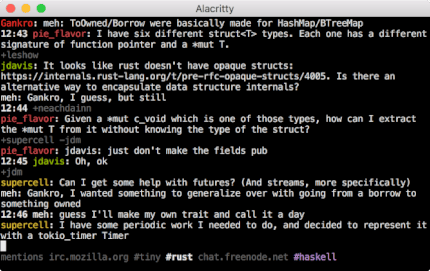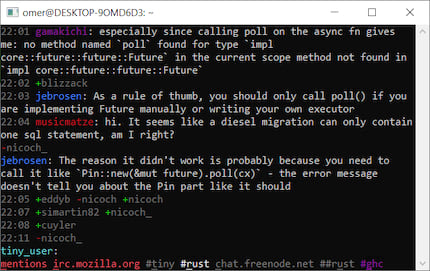6 releases
Uses old Rust 2015
| 0.1.5 | Sep 1, 2018 |
|---|---|
| 0.1.4 | Jul 30, 2018 |
| 0.1.3 | Nov 18, 2017 |
| 0.1.2 | Sep 18, 2017 |
| 0.1.0 | Jul 14, 2017 |
#886 in Command-line interface
21 downloads per month
Used in termbox_simple
14KB
249 lines
tiny - Yet another terminal IRC client
tiny is an IRC client written in Rust.



Features
-
Clean UI: consecutive join/part/quit messages are shown in a single line, time stamps for a message is omitted if it's the same as the message before. (inspired by irc-core)
-
All mentions to the user are collected in a "mentions" tab, including server and channel information. "mentions" tab solves the problem of missing mentions to you in channels after hours of inactivity.
-
Mentions to the user in a channel is highlighted (the channel tab is also highlighted in the tab list)
-
Simple config file format for automatically connecting to servers, joining channels, registering the nickname etc. See configuration section below.
-
Nick tab-completion in channels
-
Nicks in channels are colored.
-
Disconnect detection and automatic reconnects. You can keep tiny running on your laptop and it automatically reconnects after a sleep etc.
-
Configurable key bindings inspired by terminal emulators and vim. See key bindings section below.
-
Configurable colors
-
SASL authentication
-
Configurable desktop notifications on new messages (opt-in feature behind a feature flag, see below)
-
znc compatible
-
TLS support
Installation
tiny works on Linux and OSX. Windows users can run it under Windows Subsystem for Linux.
For pre-built binaries see releases. To build from source make sure you have Rust 1.48 or newer. By default tiny uses rustls for TLS support, and desktop notifications are disabled.
-
To use system TLS library (OpenSSL or LibreSSL), add
--no-default-features --features=tls-nativeto the command you're using. Note that this requires OpenSSL or LibreSSL headers and runtime libraries on Linux. -
To enable desktop notifications add
--features=desktop-notifications. This requires libdbus on Linux.
To install in a clone:
cargo install --path crates/tiny
If you don't want to clone the repo, you can use
cargo install --git https://github.com/osa1/tiny
If you have an older version installed, add --force to the command you're
using.
Arch Linux users can install the latest stable and development versions of tiny through the AUR.
tiny is tested on Linux and OSX.
Configuration
tiny looks for these places for a config file:
- On Linux:
$XDG_CONFIG_HOME/tiny/config.yml, on macOS:$HOME/Library/Application Support/tiny/config.yml - (when not found)
$HOME/.config/tiny/config.yml - (when not found, deprecated)
$HOME/.tinyrc.yml
When a config file is not found in one of these locations tiny creates one in the first path above with defaults and exits, printing path to the config file. Edit that file before re-running tiny to change the defaults.
A note on nick identification: Some IRC servers such as ircd-seven (used by
Freenode) and InspIRCd (used by Mozilla) support identification via the PASS
command. This way of identification (rather than sending a message to a service
like NickServ) is better when some of the channels that you automatically
join require identification. To use this method enter your nick password to the
pass field in servers.
Using external commands for passwords
When a password field in the config file is a map with a command key, the
value is used as the shell command to run to get the password.
For example, in this config:
sasl:
username: osa1
password:
command: 'pass show "my irc password"'
tiny runs the pass ... command and uses last line printed by the command as
the password.
Command line arguments
By default (i.e. when no command line arguments passed) tiny connects to all servers listed in the config. tiny considers command line arguments as patterns to be matched in server addresses, so you can pass command line arguments to connect to only a subset of servers specified in the config. For example, in this config:
servers:
- addr: irc.libera.chat
...
- addr: irc.gnome.org
...
By default tiny connects to both servers. You can connect to only the first
server by passing libera as a command line argument.
You can use --config <path> to specify your config file location.
Key bindings
Key bindings can be configured in the config file, see the wiki page for details.
Default key bindings:
-
C-a/C-emove cursor to beginning/end in the input field -
C-kdelete rest of the line -
C-wdelete a word backwards -
C-left/C-rightmove one word backward/forward -
page up/page down,shift-up/shift-down, orC-u/C-dto scroll -
C-n/C-pnext/previous tab -
C-c enterquit (asks for confirmation) -
alt-{1,9}switch to nth tab -
alt-{char}switch to next tab with underlinedchar -
alt-0switch to last tab -
alt-left/rightmove tab to left/right -
C-xedit current message in$EDITOR
Commands
Commands start with / character.
-
/help: Show help messages of commands listed below. -
/msg <nick> <message>: Send a message to a user. Creates a new tab. -
/join <channel>: Join to a channel -
/close: Close the current tab. Leaves the channel if the current tab is a channel. Leaves the server if the tab is a server. You can use/close <reason>to send a goodbye message. -
/connect <hostname>:<port>: Connect to a server. Usesdefaultsin the config file for nick, realname, hostname and auto cmds. -
/connect: Reconnect to the current server. Use if you don't want to wait tiny to reconnect automatically after a connectivity problem. -
/away <msg>: Set away status -
/away: Remove away status -
/nick <nick>: Change nick -
/names: List all nicks in the current channel. You can use/names <nick>to check if a specific nick is in the channel. -
/reload: Reload TUI configuration -
/clear: Clears tab contents -
/switch <string>: Switch to the first tab which has the given string in the name. -
/ignore: Ignorejoin/quitmessages in a channel. Running this command in a server tab applies it to all channels of that server. You can check your ignore state in the status line. -
/notify [off|mentions|messages]: Enable and disable desktop notifications. Running this command in a server tab applies it to all channels of that server. You can check your notify state in the status line. -
/quit: Quit. You can use/quit <reason>to send a goodbye message.
Server commands
For commands not supported by tiny as a slash command, sending the command in the server tab will send the message directly to the server.
Examples:
LISTwill list all channels on the serverMOTDwill display the server Message of the DayRULESwill display server rules- etc...
Community
Join us at #tiny in irc.oftc.net to chat about anything related to tiny!
lib.rs:
Interprets the terminal events we care about:
- Resize events.
- Keyboard input.
Resize events are handled by registering a signal handler for SIGWINCH.
Keyboard events are read from stdin. We look for byte strings of key combinations that we care about. E.g. Alt-arrow keys, C-w etc.
Dependencies
~1.5MB
~37K SLoC